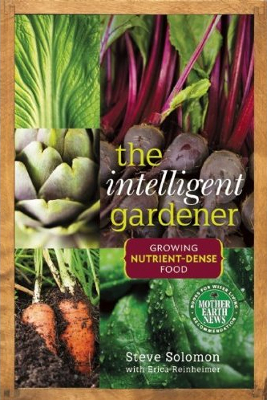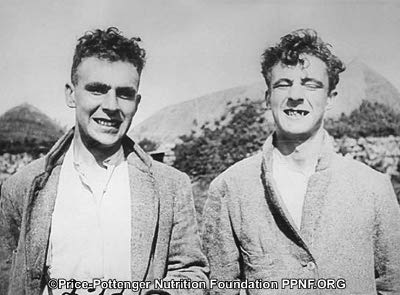
The Intelligent Gardener
 The
Intelligent Gardener,
by Steve
Solomon, is a
fascinating and well-written, if potentially
controversial, explanation of how to grow more nutrient-dense
vegetables
by balancing your soil. If you've heard of William Albrecht
and/or Michael Astera, but didn't feel comfortable wading through old
classics, Solomon's book is the quick and easy way to access the same
data.
The
Intelligent Gardener,
by Steve
Solomon, is a
fascinating and well-written, if potentially
controversial, explanation of how to grow more nutrient-dense
vegetables
by balancing your soil. If you've heard of William Albrecht
and/or Michael Astera, but didn't feel comfortable wading through old
classics, Solomon's book is the quick and easy way to access the same
data.
Steve Solomon stumbled
across the work of Albrecht after coming to
similar conclusions on his own. He and his family lived for nine
years in Oregon, where they grew most of their own food on worn-out
soil that was deficient in several major nutrients. As a result,
Solomon and his wife began to get sick, with lowered energy levels,
loose teeth, and soft fingernails. A six-month vacation in Fiji
created drastic changes in their vitality, due (Solomon believes) to
the local produce grown in soil fertilized by silt from volcanic
rocks. This experience led him to the work of Weston Price, who
argued that we really need four (or more) times the recommended daily
allowance of calcium, magnesium, phosphorus, iron, and vitamins A, D,
and E for best health. To get those high levels of vitamins and
minerals, Albrecht adds, you must garden in well-balanced soil full of
minerals.
The conclusions Solomon
comes to from studying these older scientists
is in stark contrast to conventional organic gardening wisdom, most of
which derived from texts published by Rodale Press, so many of us might
find parts of Solomon's argument to be heresy. The Rodale way is
to focus on organic matter and pH only, adding compost and lime as
necessary until soil is in good shape. Solomon argues that this
focus on lime (often dolomitic, meaning lots of magnesium comes along
with the calcium) makes sense for  chemical farmers, since their
fertilizers acidify soil and leach calcium, but organic growers need a
more nuanced understanding of soil chemistry. Meanwhile, Solomon
posits that too much organic matter actually unbalances your
soil. (More on his solution to both of these issues in later
posts.)
chemical farmers, since their
fertilizers acidify soil and leach calcium, but organic growers need a
more nuanced understanding of soil chemistry. Meanwhile, Solomon
posits that too much organic matter actually unbalances your
soil. (More on his solution to both of these issues in later
posts.)
While The
Intelligent Gardener
is easy to read and presents the data very well, I still have questions
about the kookiness level of the information itself. For example,
all of the reasoning behind remineralizing soil is based on correlative
(not causative) studies, meaning that no one took the time to do a
side-by-side comparison of nutrient density of vegetables grown in
balanced and unbalanced soil. Solomon admits this fact freely,
when he writes: "Despite Albrecht's brilliance, it is quite possible he
succumbed to the same malady many garden writers suffer from ---
succeeding in his backyard and expanding it to include the whole
continent." But the information is worth considering with a
critical eye, so I'll be regaling you with the highlights of the book
as this week's lunchtime series.
This
post is part of our The Intelligent
Gardener lunchtime series.
Read all of the entries:
|
Want more in-depth information? Browse through our books.
Or explore more posts by date or by subject.
About us: Anna Hess and Mark Hamilton spent over a decade living self-sufficiently in the mountains of Virginia before moving north to start over from scratch in the foothills of Ohio. They've experimented with permaculture, no-till gardening, trailersteading, home-based microbusinesses and much more, writing about their adventures in both blogs and books.
Want to be notified when new comments are posted on this page? Click on the RSS button after you add a comment to subscribe to the comment feed, or simply check the box beside "email replies to me" while writing your comment.

Hi Bess,
Soil test a good idea. Get a good one - Mo, Co, Se, Ge, Zn, Cu, B for openers.
An impressive number of very smart people make statements like:
"All disease is the result of a mineral imbalance."
Please do your own research. I suspect you will come to agree.
That said: Just what minerals in what ratios ARE needed?
A VERY good question! Some of the vet manuals give a pretty good idea of cause, effect and cure. There is probably more unknown than known. If you find a good answer I am all ears :).
John
Bess --- Yeah, I wish he'd left that anecdote out. It's the very one that set off my kooky-meter.
Roland --- That's a good question, but I tend to think it's worth fixing soil deficiencies rather than taking a multivitamin for a variety of reasons. First, I've seen data that suggests we don't uptake vitamins and minerals as well in pill form as in food form (and we've been discovering new vitamins and minerals throughout the twentieth century, so I'm not yet ready to assume we know everything the human body needs.)
Perhaps more relevantly, fixing the soil improves flavor and yields since the plants growing there are healthier. For us, it's all about flavor, and anything we can do to make our strawberries taste even better is well worth it.
Hi Anna,
Many of the farmers I know taste test their food as the ultimate test.
Check out tandjenterprises.com. A year or so ago I got a few Brix 10 tomatoes using his method. Yummy. It's the only method I know that actually delivers real results.
FWIW the lettuce I test around here has a Brix of 2 :(. Well below POOR !
I haven't gotten into growing lettuce yet, but it's on the list :).
John
Hi Anna,
Have you read other soil mineralization texts such as Michael Astera's "The Ideal Soil"? The reason I ask is that I'm just jumping into this whole soil test/mineralization stuff for my garden and I would like some perspectives on which authors offer the most reasonable advice (reading between the lines...I want to purchase the book that has maximum scientific backing with minimal kook factor). Are they all based on Albrecht's theories or do they offer additional insights into soil mineralization? BTW I love your blog!
On multi-vitiamins... I tend to believe the nickname "Bed Pan Bullets" is likely fitting. I haven't personally done any studies or read any research on the subject but I feel that unless something is assimilated naturally (in food in this case) it probably isn't as effective (if at all). Simply looking at instances where we know this is the case leads me to this conclusion. An example would be breast-fed babies compared to formula/bottle fed. We probably have no idea of the adverse health effects of formula feeding babies. Not trying to step on any toes-- I formula fed my own babies -- I just wish I hadn't have done so.
On soil amendments... I want to run and hide from charts with mathematical formulas! Haha! Seriously, I'm so thankful for people who thrive on that side of the brain, but if learning to do those calculations were requisite to successful gardening I'd probably have to quit. I think what human beings do best is make very simple things extremely complicated. (Something I've been very successful at doing in many areas.) But the idea of homesteading is about living simpler. It's hard physically to be sure. But it shouldn't be mentally exhausting. I also don't want to have to be dependent on getting large amounts of this and that from some company. My boys and I collect rocks all over our property for raised beds and such, and one of our biggest delights is examining the soil throughout the forest floor. No one is amending it (but God) yet the life and health that springs forth from it has clearly been provided for. I think adding amendments is good -- I add manure to everything. I just don't think it has to be so complicated. We are so limited in our understanding of chemicals and how they react to one another that our best bet is to leave it to natural processes as much as possible. I know we have figured out a lot, bit I believe it's a fraction of a drop in the bucket compared to what we don't know.
Another instance of adverse effects of interfering with natural processes is with poultry. Some say it has been bred out of chickens to hatch out their eggs. We were overjoyed to have a pasture-raised hen hatch two clutches, but more often than not, eggs are hatched in incubators and the natural habits of chickens are growing extinct. I'm not against incubators, but at the same time I treasure a hen who will act like a mama hen, hatch out her eggs and train/protect them. SO SO fun to watch!! thanks for allowing my ramblings... = )
~Jehovah-jireh~ "The Lord Provides"
Very wonderful reading!
Thank you